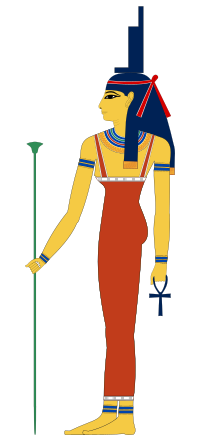Isis (goddess)
| Isis | |
|---|---|
| Goddess of health, marriage, and wisdom | |

The goddess Isis portrayed as a woman, wearing a headdress shaped like a throne and with an Ankh in her hand
|
|
| Major cult center | Philae, Abydos |
| Symbol | the throne, the sun disk with cow's horns, sparrow, cobra, vulture, sycamore tree, kite (bird) |
| Personal Information | |
| Consort | Osiris |
| Offspring | Min, Horus, Bastet, and possibly Ammit |
| Parents | Geb and Nut |
| Siblings | Osiris, Set, Nephthys and Haroeris |
Isis (/ˈaɪsɪs/; Ancient Greek: Ἶσις IPA: [îː.sis]; original Egyptian pronunciation more likely "Aset" or "Iset") is a goddess from the polytheistic pantheon of Egypt. She was first worshiped in ancient Egyptian religion, and later her worship spread throughout the Roman Empire and the greater Greco-Roman world. Isis is still widely worshiped by many pagans today in diverse religious contexts; including a number of distinct pagan religions, the modern Goddess movement, and interfaith organizations such as the Fellowship of Isis.
Isis was worshipped as the ideal mother and wife as well as the patroness of nature and magic. She was the friend of slaves, sinners, artisans and the downtrodden, but she also listened to the prayers of the wealthy, maidens, aristocrats and rulers. Isis is often depicted as the mother of Horus, the falcon-headed deity associated with king and kingship (although in some traditions Horus's mother was Hathor). Isis is also known as protector of the dead and goddess of children.
...
Wikipedia
